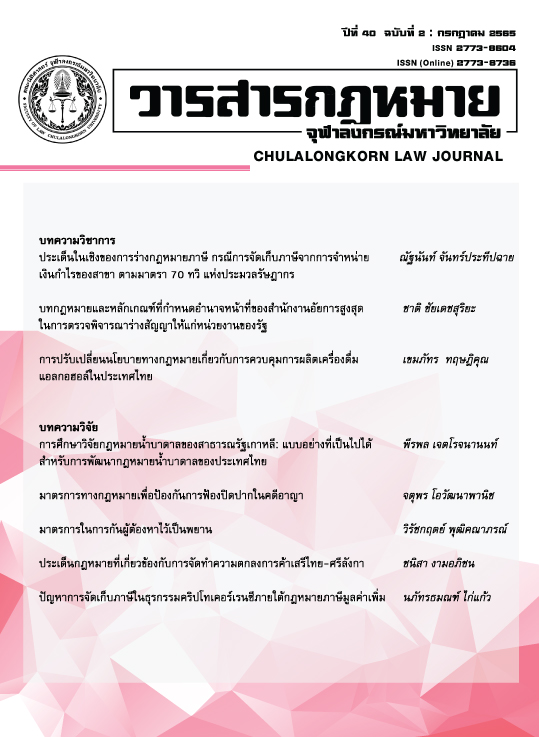การศึกษาวิจัยกฎหมายน้ำบาดาลของสาธารณรัฐเกาหลี: แบบอย่างที่เป็นไปได้สำหรับการพัฒนากฎหมายน้ำบาดาลของประเทศไทย
Main Article Content
บทคัดย่อ
น้ำบาดาลมีอยู่ในวัฏจักรตามธรรมชาติของน้ำซึ่งให้คุณค่าในการหล่อเลี้ยงระบบนิเวศและใช้ประโยชน์ในกิจกรรมต่าง ๆ ของมนุษย์ โดยการบริหารจัดการน้ำบาดาลจะอยู่บนพื้นฐานของหลักธรรมภิบาลน้ำบาดาลซึ่งเป็นหลักการสากลที่สอดแทรกอยู่ในการระบบการบริหารจัดการน้ำบาดาลของประเทศต่าง ๆ โดยกฎหมายน้ำบาดาลของสาธารณรัฐเกาหลีเป็นตัวอย่างกฎหมายที่กำหนดเรื่องการจัดการน้ำบาดาลภายใต้หลักธรรมาภิบาลน้ำบาดาลที่ชัดเจน และมีมาตรการที่น่าสนใจเหมาะสมแก่การนำมาศึกษาเพื่อเป็นแบบอย่างในการพัฒนากฎหมายน้ำบาดาลของไทย แม้ว่าประเทศไทยได้มีการตราพระราชบัญญัติน้ำบาดาล พ.ศ. 2520 เพื่อใช้ในการบริหารจัดการและควบคุมการใช้น้ำบาดาลในประเทศ แต่กฎหมายดังกล่าวได้บังคับใช้มาเป็นเวลายาวนานและอาจไม่ทันต่อสถานการณ์ที่เปลี่ยนแปลงไปอย่างรวดเร็ว ดังนั้น การนำแนวคิดภายใต้กฎหมายเกาหลีใต้มาศึกษาจึงเป็นประโยชน์แก่การสร้างความคิด และความเข้าใจแก่ผู้ที่เกี่ยวข้องในการยกร่างกฎหมายเพื่อที่จะนำมาใช้เป็นแนวทางในการพัฒนากฎหมายน้ำบาดาลอย่างเหมาะสม จากการศึกษาวิจัย กฎหมายน้ำบาดาลของเกาหลีใต้มีบริบทในการใช้น้ำบาดาลและบริบทด้านระบบกฎหมายใกล้เคียงกับประเทศไทย ซึ่งมีความเป็นไปได้ที่ประเทศไทยจะนำมาปรับใช้ในการพัฒนากฎหมายน้ำบาดาลของไทย โดยเฉพาะในประเด็นเรื่องการกำหนดขอบเขตการใช้น้ำบาดาล การอนุญาตใช้น้ำบาดาล การควบคุมการใช้น้ำบาดาล และการส่งเสริมให้มีการอนุรักษ์และพัฒนาน้ำบาดาล ซึ่งสามารถนำข้อเสนอแนะทางวิชาการในประเด็นเหล่านี้ไปพัฒนา ปรับปรุงแก้ไขให้กฎหมายน้ำบาดาลของไทยมีประสิทธิภาพ มีความทันสมัย และสอดคล้องกับหลักธรรมาภิบาลน้ำบาดาลมากยิ่งขึ้น
Article Details

อนุญาตภายใต้เงื่อนไข Creative Commons Attribution-NonCommercial-NoDerivatives 4.0 International License.
ลิขสิทธิ์และเนื้อหาในเว็บไซต์ของวารสารกฎหมาย (รวมถึง โดยไม่จำกัดเฉพาะ เนื้อหา รหัสคอมพิวเตอร์ งานศิลป์ ภาพถ่าย รูปภาพ ดนตรีกรรม โสตทัศนวัสดุ) เป็นกรรมสิทธิ์ของวารสารกฎหมาย และผู้ได้รับการโอนสิทธิทุกราย
1. วารสารกฎหมาย ให้อนุญาตให้คุณใช้สิทธิอันไม่เฉพาะเจาะจงที่สามารถถูกถอนเมื่อใดก็ได้ โดยไม่มีค่าใช้จ่าย ในการ
- เยี่ยมชมเว็บไซต์และเอกสารในเว็บไซต์นี้ จากคอมพิวเตอร์หรือเครื่องมือสื่อสารผ่านเว็บบราวเซอร์
- คัดลอกและจัดเก็บเว็บไซต์และเอกสารในเว็บไซต์นี้บนลงคอมพิวเตอร์ของคุณผ่านระบบความจำ cache
- สั่งพิมพ์เอกสารจากเว็บไซต์นี้สำหรับการใช้ส่วนตัวของคุณ
- ผลงานที่ได้รับการตีพิมพ์โดยวารสารกฎหมาย จุฬาลงกรณ์มหาวิทยาลัย ถูกคุ้มครองภายใต้ Creative Commons Attribution 4.0 International License ซึ่งอนุญาตให้ทุกคนสามารถคัดลอก แจกจ่าย ดัดแปลง ส่งต่อ ผลงานได้ ก็ต่อเมื่อผลงานและแหล่งข้อมูลได้รับการอ้างอิงอย่างเหมาะสม
2. วารสารกฎหมาย จุฬาลงกรณ์มหาวิทยาลัย สงวนสิทธิ์ไม่อนุญาตให้คุณใช้สิทธิอื่นใดที่เกี่ยวข้องกับเว็บไซต์และเอกสารบนเว็บไซต์นี้ เช่น การคัดลอก ดัดแปลง เปลี่ยนแปลง ส่งต่อ ตีพิมพ์ แจกจ่าย เผยแพร่ จัดแสดงในที่สาธารณะ ไม่ว่าจะในรูปแบบใดก็ตาม ซึ่งเว็บไซต์หรือเอกสารบนเว็บไซต์ โดยไม่อ้างอิงถึงแหล่งข้อมูลหรือโดยไม่ได้รับอนุญาตเป็นลายลักษณ์อักษรจากวารสารกฎหมาย จุฬาลงกรณ์มหาวิทยาลัย
3. คุณอาจขออนุญาตที่จะใช้เอกสารอันมีลิขสิทธิ์บนเว็บไซต์นี้โดยการเขียนอีเมลล์มายัง journal@law.chula.ac.th
4. วารสารกฎหมาย จุฬาลงกรณ์มหาวิทยาลัย เข้มงวดกับการคุ้มครองลิขสิทธิ์อย่างมาก หากวารสารกฎหมาย จุฬาลงกรณ์มหาวิทยาลัยพบว่าคุณได้ใช้เอกสารอันมีลิขสิทธิ์บนเว็บไซต์นี้โดยไม่ถูกต้องตามการอนุญาตให้ใช้สิทธิ ดังที่กล่าวไปข้างต้น วารสารกฎหมาย จุฬาลงกรณ์มหาวิทยาลัยอาจดำเนินคดีตามกฎหมายต่อคุณได้ เพื่อเรียกร้องค่าเสียหายที่เป็นตัวเงินและคำขอชั่วคราวให้คุณหยุดการใช้เอกสารดังกล่าว ทั้งนี้ คุณอาจถูกสั่งให้ชดใช้ค่าใช้จ่ายใดๆ ที่เกี่ยวข้องกับการดำเนินการตามกฎหมายนี้
หากคุณพบเห็นการใช้เอกสารอันมีลิขสิทธิ์ของวารสารกฎหมาย จุฬาลงกรณ์มหาวิทยาลัย ที่ขัดหรืออาจขัดต่อการอนุญาตให้ใช้สิทธิดังที่ได้กล่าวไปข้างต้น โดยเชื่อว่าได้ละเมิดลิขสิทธิ์ของคุณหรือของผู้อื่น สามารถร้องเรียนมาได้ที่ journal@law.chula.ac.th


